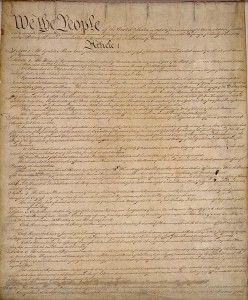Legislature attacks California property rights
by CalWatchdog Staff | May 18, 2012 8:10 am
May 18, 2012
By Katy Grimes
A bill was passed by the Assembly Thursday which would allow a newly created, protected class of individuals to legally hide ownership of property by claiming a public safety classification.
 [1]
[1]
By hiding their ownership information, these individuals would be able to conduct business outside of the scrutiny of the public, undoubtedly resulting in different classes of property owners, as well as the demise of California’s constructive notice property rights system.
AB 2299, [2]by Assemblyman Mike Feurer, D-Los Angeles, “authorizes the board of supervisors of a county to establish a program whereby the names of certain public safety officials may be redacted upon request from any property record of principal residence that is disclosed to the public by that county,” the bill analysis[3] states.
In his floor speech about AB 2299, Feurer shared dramatic stories of gang murders, drive-by shootings and violence as the reason public safety officials need to be able to hide their property ownership records.
But the bill violates the historic “constructive notice[4]” laws, which means that persons are assumed to have knowledge of something by virtue of the fact that it is in the public record. The legal status of property ownership, for example, is available through public records.
Another legal example is the symbol ®, which provides “constructive notice” that a trademark or service mark has been registered, is no longer in the public domain[5] and is unavailable for anyone else to use.
“Property records are public records—the public has a right to know who owns property,” said Assemblyman Chris Norby, R-Fullerton. “Public officials hide behind this.” Norby said he was concerned about the definition of public safety because it has been so broadened.
Norby gave the example of the city of Vernon, which declared as public safety officials its entire legal staff as well as contract legal staff.
Norby said that there already is protection for public safety officials. He asked where the definition would stop—teachers, other public employees or even the legislative body?
Assemblyman Don Wagner, R-Irvine, an attorney, said he was tempted to oppose the legislation, but felt that the bill did not overreach because public safety officials must opt-in to participate, if they feel threatened.
The bill analysis says that the public safety officials eligible for the protections are: a) employees of federal, state or local law enforcement agencies (except clerical and non-operational staff); b) judges, magistrates, court commissioners and referees; c) criminal attorneys with a federal, state or local prosecutorial or defense agency; d) employees of a federal, state or local prosecutorial or defense agency routinely in contact with suspects; and e) employees of a federal, state or local agency responsible for inmates, or those acting as a custodian, probation or parole officer.
Elected officials are explicitly excluded from the program.
Opposition
County Recorders across the state opposed the bill. Kammi Foote, Inyo County clerk-recorder[6], explained her opposition: “Under the provisions of AB 2299, certain documents would no longer be open to public inspection creating a system where only the government could verify real property ownership. If certain records were removed or hidden from the public it would be impossible for California citizens to independently prove ownership of their own homes.”
“Historically, governments have used control of land ownership to be oppressive in governing those they rule,” Foote added. “In many countries today citizens are prevented from knowing who owns land unless the ‘government’ allows them to know.”
Other opponents of AB 2299[7] argued at a recent hearing that there are many different issues arising from the bill, including that the current clerk-recorder computer systems are not designed to permit wholesale redaction. “According to the California Land Title Association, the sponsors of AB 2299 have an inaccurate understanding of how county recorder records are held, maintained and shared with interested parties” the bill analysis states. “Unlike traditional ‘databases’ held by many governmental and private companies and individuals, county recorders do NOT hold scanned documents in a pure data format that can be queried, sorted, cloaked, and manipulated any number of ways within the database program. Thus, AB 2299 is difficult, if not impossible, to implement.”
The Santa Clara County Assessor estimates that the cost to develop a system to comply with this bill would range from $150,000 to more than $500,000.
And AB 2299[7] would make it impossible for a member of the public to verify ownership of their own home. Under AB 2299[7], only the government could verify real property ownership.
Potential for fraud
The California Newspaper Publishers Association[8] is opposed to AB 2299 and expressed concerns at a recent hearing about how a confidentiality program might be used to perpetrate fraud: “AB 2299 would bar journalists and the public from investigating the situation unfolding in Los Angeles where the assessor is accused of collecting campaign contributions from property owners in exchange for lowered property assessments. The bill would completely insulate and protect any public safety official who might be involved in this type of scheme and would eradicate any public scrutiny, oversight or accountability.”
In an op-ed to her local newspaper, Foote wrote, “If even one document was removed from the records or shielded from the public eye, the entire system is compromised. To safeguard the real property rights of Americans, Congress and state legislatures, designed a system of recording land records that was open to public inspection and safe from the interference of government control.”
Foote said that property ownership can be proved if all recorded documents remain open to public inspection. “This is the way that property rights have been verified since the founding of this country.”
- [Image]: http://www.calwatchdog.com/2011/02/07/the-real-meaning-of-the-constitution/cpage1/
- AB 2299, : http://www.aroundthecapitol.com/Bills/AB_2299/20112012/
- bill analysis: http://www.aroundthecapitol.com/billtrack/analysis.html?aid=243241
- constructive notice: http://definitions.uslegal.com/c/constructive-notice/
- public domain: http://biztaxlaw.about.com/od/glossaryp/g/publicdomain.htm
- Kammi Foote, Inyo County clerk-recorder: http://www.inyocounty.us/Recorder/Clerk-Recorder.html
- AB 2299: http://www.aroundthecapitol.com/billtrack/analysis.html?aid=243241
- California Newspaper Publishers Association: http://www.cnpa.com/
Source URL: https://calwatchdog.com/2012/05/18/a-step-back-for-ca-property-rights/